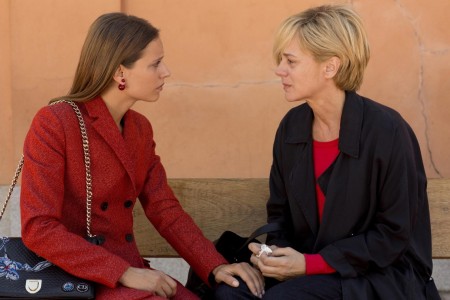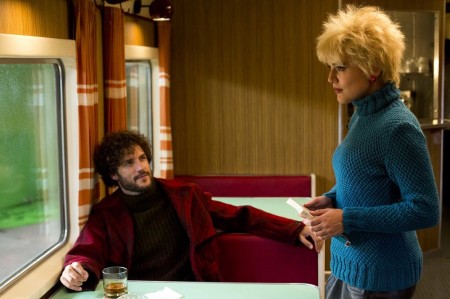 MICHELLE JENNER AND EMMA SUÁREZ IN JULIETAA sense of loss
MICHELLE JENNER AND EMMA SUÁREZ IN JULIETAA sense of lossThis adaptation of three linked stories by Canadian author Alice Monro was to have been made in America; it began as one of Almodóvar's temptations to come to Hollywood. He was going to shift the action from Canada to Massachusetts. Juliet, the woman protagonist, was going to live in Boston, and when she moved in with her fisherman lover, Eric, it was going to be on the coast of Maine. Meryl Streep was going to play Juliet. Then he switched to New York; then he gave up all notion of a movie in English, and made an Almodóvar film. But we may ask if even with jazzed up, more Mediterranean, action, glorious red-dominant scenes, and a marginally more hopeful ending, Almodóvar has not wound up with something a little too phlegmatic for his sensibility. True, in this "fourth" phase, he has been moving - sometimes: not in his over-the-top last film
I'm So Excited - toward flatter, more solemn and serious movies, without the gay abandon and giddy vulgarity of earlier work. Nonetheless Alice Munro seems a peculiar fit for him.
This is a frame tale with flashbacks. Everything is bright and clear - yet puzzles may remain. At the outset Julieta (in middle age played by an excellent Emma Suárez) meets Bea (Michelle Jenner), the erstwhile best friend of her daughter Antía (successively played by Ariadna Matin, Priscilla Delgado and Blanca Parés), who later we learn she hasn't seen since she was 18. Bea has run into her at Lake Como. Julieta was on the point of moving to Portugal with her partner, Lorenzo (Dario Grandinetti). Now, since through Bea Antía knows she's still in Madrid, Julieta gives up that plan, lets Lorenzo move to Portugal on his own, and moves by herself into an apartment - with hideous wallpaper - in the building where she raised Antía originally. Julieta had given up a prolonged search for Antía , and in fact moved away from anything that reminded her of her lost daughter.
In the ugly flat, Julieta writes letters to her daughter, and we get flashbacks that sort of fill us in. There is the Hitchcockian meeting on the train with the hunky, sensitive fisherman from Galicia, Xoan (Daniel Grao). (We don't actually see him do anything so messy as catch fish.) A tragic event has happened on the train, but Julieta (played young by the strikingly pretty Adriana Ugarte) and Xoan make passionate love and Antía is conceived. (In the Munro story, Juliet was having her period and they only kiss.) Xoan is married, but his wife doesn't understand him, not surprisingly, since she's in a coma. Julieta comes to visit Xoan conveniently at the time of his wife's funeral. His housekeeper Marian (Almodóvar regular Rossy de Palma with a fake milky eye and an ugly Afro wig) isn't very friendly; later she will be, though the relentless storytelling pace doesn't fit in an explanation. Also woven into the busy storytelling is Xoan's "friend" Ava (Inma Cuesta), an artist who makes the little heavy terra cotta covered bronzes with tubular penises (actually by Miquel Navarro) that Almodóvar himself likes to collect. Ava, like other characters, is somewhat inexplicably taken away from us, in her case by a debilitating illness.
In fact the tragedy that happens isn't very affecting either, but it's caused by a terrible storm. There is an interlude about Julieta's parents (Susi Sanchez and Joaquin Notario), and about teen girlfriends Antía and Bea. We see them flitting about, but their relationship, and personalities, aren't much developed. Why Antía disappears - chooses not to return from the three-month spiritual retreat she goes on, which perhaps is a brainwashing session, the work of a cult - remains a mystery until near the end, where there is a reference to Patricia Highsmith (whose first book
Strangers on a Train was of course adapted superbly by Hitchcock) - and a theme out of Highsmith's book that became Haynes'
Carol.
While diehard fans may indeed find this "fourth phase" Almodóvar too flat, the problem may be more that it's hard to get your head around the three interlocking stories; that Almodovar's adaptation hasn't given them enough harmony or enough subordination. The plot, with its diverging directions and sudden shocks, is both confusing and uninvolving.
Of course there is craft to enjoy. In the early scenes especially, the Almodóvar painterly visual style is much in evidence, and a delight to the eyes, Anton Gomez’s production design and delightfully gaudy color, with a predominance of red; and Jean Claude Larrieu's pleasingly bright and clear cinematography - though Almodóvar had to shoot in digital and not film this time, which he didn't like, as D.T. Max tells in his recent profile in
The New Yorker. Sometimes even in my favorite Almodóvar films, like
Talk to Her, I just like to escape into the colors, and ignore the action. As others have noted, Almodóvar does something interesting here: he presents a melodrama as if it were a thriller - an effect especially augmented by the train sequence and by the girl's disappearance. (A character in
Tie Me Up! Tie Me Down! comments it's hard to tell a love story from a horror story sometimes.) He also presents some striking images, such as Julieta's heart beating under a fabric, and the stag running alongside the train framed by the window, seen by Julieta and a man who is to commit suicide. But in the end this movie seems not so much a thriller as a soap opera - with glamorous settings and high production values.
Underdeveloped here, from Munro's stories, is the role of faith, which Juliet denies, and her daughter goes in search of. That may be the key to the whole thing. There's a lot here in Almodóvar's movie, but it's not enough. I walked out of
Julieta feeling unfulfilled. Obviously one should read the three stories, "Chance," "Soon" and "Silence" by Alice Munro, to understand the film's ending, as other writers have suggested.
Julieta, 99 mins., debuted at Cannes May 2016; nearly two dozen other international festivals including Toronto, New York,; London. Mill Valley, and Palm Springs. US theatrical release starting 21 Dec. 2016.
 DANIEL GRAO AND ADRIANA UGARTE IN JULIETA
DANIEL GRAO AND ADRIANA UGARTE IN JULIETA




